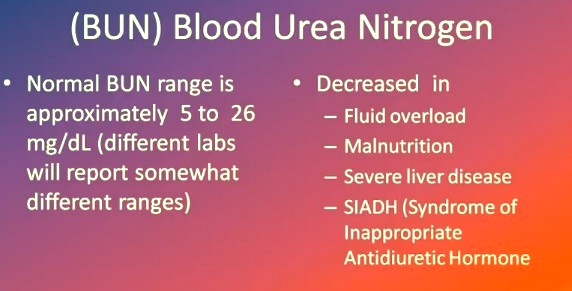Normal BUN levels are signs that the body breaks down and releases the excess proteins properly. It shows that the liver and kidney are doing their metabolic and excretory functionscorrectly. Serious health problems like kidney diseases and liver problems can make the BUN levels of a person go beyond the normal range.
Normal BUN levels are determined through the simple BUN test. The test will also give the doctor an idea how his or her patient’s kidneys are doing after receiving some form of treatment for kidney disease. The BUN test will help people with elevated or decreased BUN levels seek the doctor’s advice and take appropriate action to get it back to its normal range.
What is BUN Test and how is it done?
BUN refers to the Blood Urea Nitrogen, and the test is used to assess the urea nitrogen content in the bloodstream. Urea is excreted by the liver after the metabolism and digestion of food. This occurs as a result of the breaking down of protein in the liver forming amino acids which break up into smaller units called ammonia. As ammonia molecules group together, urea is formed and transported into the kidneys through the bloodstream which releases it in the form of urine. Normal BUN levels indicate that the liver and kidneys process and release proteins properly.
A patient is obliged to refrain from consuming foods high in protein within 24 hours before drawing the blood sample for the BUN test. Bleeding or other related problems rarely occur during the test. The test is primarily done to evaluate the kidney and liver function of the patient as well as detect certain forms of kidney diseases.
What is the normal level of BUN?
Normal BUN levels differ with age and gender. A healthy male adult must have BUN levels from 8 to 24 mg/dL, while a healthy female adult should have it from 6 to 21mg/dL. The normal BUN levels for children fall between 5 and 18 mg/dL. Meanwhile, the healthy BUN level for pregnant women is from 5 to 12 mg/dL. The normal BUN levels for children and women are relatively low due to their bodies’ ability to split up protein molecules. Oftentimes, the BUN test is done together with the Creatinine test to figure out renal problems. The normal ratio of BUN to creatinine is 20:1; any value greater than this signifies renal problem.
What does an elevated or low BUN level indicate?
Significant differences of the BUN level from the standard range is a cause of concern, be it greater than or lower than the normal range.
- High BUN level
This implies that the kidney is not functioning properly thereby paralyzing its ability to filter the urea from the liver, causing it to stay in the bloodstream. The BUN levels may increase due to kidney diseases as a result of diabetes or high blood pressure. It may also occur as a result of dehydration or heart failure; obstruction of the urinary tract due to tumor or kidney stone; bleeding in the gastrointestinal tract; Addison’s disease; tissue damage; mental shock; stress; and excessive consumption of high protein foods.
- Low Bun Level
Normal BUN levels rarely drop except for liver dysfunction. The lowering of BUN levels could be due to malnutrition, over hydration and low protein diet. BUN levels will also decrease as a result of certain medications like anabolic steroids, improper absorption of nutrients and SIADH or syndrome of inappropriate anti-diuretic secretion.

What are the indications that the BUN levels are not normal?
It is should be noted that urea is an indicator that the kidney is not working properly which is why the BUN levels are not normal. Any deviation from the normal BUN levels will bring the following conditions:
- Nausea
- Fatigue
- Dry and itchy skin
- Impaired sense of smell and taste
- Urine-like breath and body odor
What can be done to get back to normal BUN levels?
It is still possible to achieve normal BUN levels after bouts of increased or decreased BUN levels. Depending on the underlying cause of abnormal BUN levels, keeping them in normal range may involve following a lifestyle change, eating a healthy diet and maintaining appropriate medications. People with increased BUN levels due to kidney disease may be prescribed with some form of medication that is specially made to slow down the progression of the disease during its early stages. Although this does not discount the chances of dialysis in later stages to keep their BUN levels in normal range. It is also recommended to follow a special diet plan for people with kidney disease to help keep their BUN levels under control.
Normal BUN levels are important parameters signifying that the liver and kidneys are functioning as they should. A considerable change in their values, whether high or low, should not be taken lightly. Instead, follow all the doctor’s instructions with regards to medications and diet to keep BUN levels in normal range.
I am 88 years old male,
my recent blood test after breakfast w/o fasting:
BUN: 29 AVERAGE: 26 CREEATININE: 1.12 GLUCOSE: 87
IS THERE A RISK IN MY CASE. WHAT MY NEXT COURSE OF ACTION.
MOST GREATFUL FOR YOUR ADVISE.
JAY KATAB